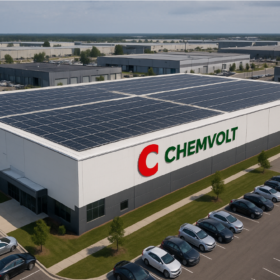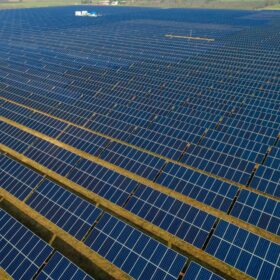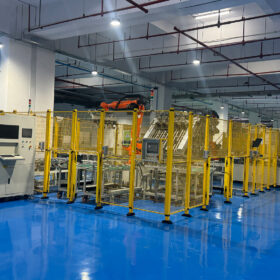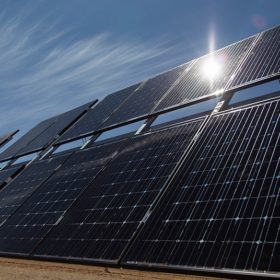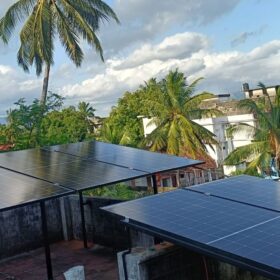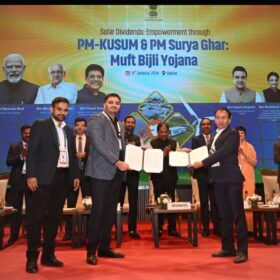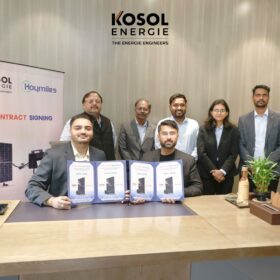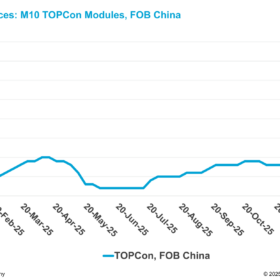ChemVolt Global announces 5 GWh lithium-ion cell manufacturing project in Andhra Pradesh
Kuldeep Gupta-led ChemVolt Global has signed a memorandum of understanding (MoU) with the Government of Andhra Pradesh to establish a 5 GWh lithium-ion cell manufacturing gigafactory in the state, with a planned investment of INR 2,500 crore.
Rays Power Infra secures INR 1,912 crore renewable energy project
Rays Power Infra Ltd has secured a 300 MW renewable energy project worth INR 1,912 crore from a state-owned company. Following this award, the company’s total order book stands at over INR 8,000 crore.
GoodEnough Energy starts production at 7 GWh battery storage factory in Noida
GoodEnough Energy has commissioned a 7 GWh battery energy storage system (BESS) factory in Noida, marking the largest such facility in India. The company plans to expand the facility’s capacity from 7 GWh to over 25 GWh over the next three years.
Evaluating India’s corporate reporting framework for climate transition readiness: A BRSR–ISSB comparison
IEEFA’s analysis finds that the International Sustainability Standards Board (ISSB) S2 offers robust climate-specific guidance, while the Business Responsibility and Sustainability Reporting (BRSR) framework adopts a broader, ESG-oriented approach, with limited alignment to climate transition planning needs.
India’s transition to green steel is expected to be gradual, driven by renewables in the near term: ICRA
ICRA expects the Indian steel industry’s decarbonization to be gradual, with near-term emission reductions driven mainly by higher adoption of renewable energy and improvements in operational efficiency, as high costs and technology constraints limit faster decarbonization.
Inox Green enters into 625 MWp solar O&M agreement with KEC
Inox Green Energy Services Ltd has secured a Letter of Award (LoA) from KEC International Ltd (KEC) to provide operations and maintenance services for a 625 MWp solar project at Bhadla, Rajasthan.
Energy storage for homes: Why hybrid inverter systems will lead the next phase of solar growth
Energy storage for homes—anchored by hybrid inverter systems—will lead the next phase of solar growth in India. Not as an upgrade, but as a necessity for a nation building toward energy independence by 2047.
Kosol Energie signs MoU for INR 90,000 crore investment in Gujarat
Kosol Energie has signed a memorandum of understanding (MoU) with the Government of Gujarat to invest INR 90,000 crore in the State. The company said the proposed investment will support the development of advanced solar module manufacturing facilities, next-generation R&D centers, large-scale renewable energy parks, and integrated green energy ecosystems.
LNK Energy announces INR 10,000 crore investment across solar manufacturing, green fuels and renewable power generation
The newly launched LNK Energy plans INR 10,000 crore investment to build an integrated clean energy platform spanning solar manufacturing, green fuels and renewable power generation. The company will start with a 6 GW solar cell and module facility with integrated ingot and wafer production in Maharashtra, with plans to expand into related component manufacturing, green hydrogen and renewable power generation.
Thermal share in power generation to drop below 70% next fiscal: Crisil Ratings
The share of thermal power in India’s electricity generation is expected to fall below 70% next fiscal, driven by slower growth in power demand and a sharp rise in renewable energy (RE) generation, according to Crisil Ratings.
